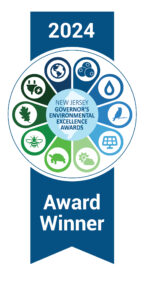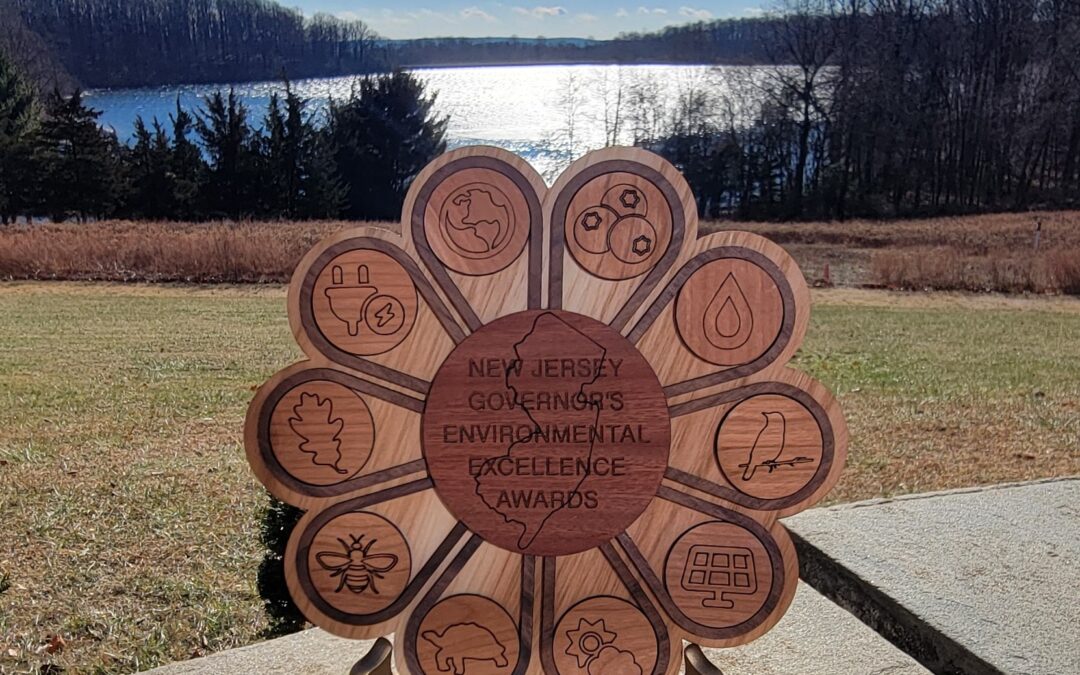On December 10, 2024, at the Historic Masonic Temple of Trenton, NJ, Merrill Creek Reservoir (MCR) was honored as the winner of the 25th annual Governor’s Environmental Excellence Award for the category of Healthy Ecosystems & Habitat. Winners of the Governor’s Environmental Excellence Awards are judged by the NJ Department of Environmental Protection (NJDEP) on the basis of documented environmental benefits, innovation and the long-term impact of the projects.
Accepting the award on the behalf of MCR were MCR Ecologist, John Parke, and Terra Engineers Principal, Ms Guilaine Roussel. However, this award truly reflects the hard work and collaboration with several entities that throughout the past year worked with MCR staff on various habitat, natural resources and wildlife restoration projects. These project collaborators included: NJ Youth Corps of Phillipsburg, New Jersey Audubon, the staff of Terra Engineers, Rocky Top Forest Management LLC, the MCR Stewardship volunteer Group, the USFWS Partners for Fish and Wildlife Program and the Xerces Society.
“Collaboration is a powerful tool to effect change,” said MCR Ecologist John Parke. “Much like the Merrill Creek Owners Commitee (MCR is owned by a consortium of several electric sector companies), by working within collaborative groups, projects are guided by trust and reciprocity, project actions tend to be more highly adaptive and naturally creative. By working with collaborators

(L to R) Jane Rosenblatt, Deputy Commissioner, NJ Department of Environmental Protection; Guilaine Roussell, Principal, Terra Engineers; John Parke, Ecologist, Merrill Creek Reservoir; and David Zimmer, Executive Director, NJ Infrastructure Bank at the 2024 GEE Awards Ceremony
towards a common goal, ideas are ‘cross-pollinated’ and information is gathered collectively and more opportunities for innovation and strong strategies for change are achieved. I cannot thank enough the fine people and organizations that have collaborated with MCR to steward our land.”
To manage its lands, wildlife, habitat and other ecosystem services that the property provides the local community, as well as the region associated with the Delaware River Basin, MCR implements a NJ approved Forest Stewardship Plan (FSP). Although the FSP itself is a tool for the management of the property, MCR voluntarily implements additional complementary conservation projects to the FSP that enhance and/or restore other ecological resources at MCR. “The habitat enhancements and restorations at MCR are expected to have far-reaching benefits, not just for wildlife, but for surrounding communities as well.” said John Parke. “By bringing in talented and passionate collaborators and working towards a common goal, we solidified a symbiotic relationship with communities to foster environmental awareness while enhancing wildlife and natural systems. Our habitat projects here at MCR serve as models for recognizing the benefits of collaboration for restoration, protection and stewardship of natural resources.”
Specifically, the award recognizes the following voluntary conservation practices and/or restorations that were performed on the MCR property in 2024. These include: forest stand/ habitat improvement practices; native grassland management, and creation or enhancement of several demonstration pollinator gardens, all to benefit various wildlife species, including several declining species that are found on the property. In total, this work over the past year equates to 173.35 of active habitat management.
Additionally, MCR improved fish habitat at the property in 2024 by creating underwater structure via repurposing an invasive woody species, Autumn Olive (Elaeagnus umbellata), cut from their grassland restoration work. The olive was used in creating 78 “spider blocks”, along with utilizing logs generated from forest stewardship activities to build 17 “fish-cribs”, that were deployed into the reservoir. Typically, when constructing Spider Blocks, PVC tubes or plastic pipes are cemented into concrete blocks to create weighted vertical structure. However, MCR is using the non-native invasive vegetation species Autumn Olive in place of the plastic tubes/pipes as the vertical structure. By using natural materials rather than plastics, we are removing the risk of plastics in the reservoir off-gassing or releasing microplastics into the water over time, while still proving critical underwater structure for fish, macroinvertebrates, and other aquatic organisms to use for shelter, nurseries or foraging areas.
In 2024 MCR also continued to work with NJ Audubon on a USDA-NRCS Conservation Innovation Grant project on 8 acres of the property by testing the use of a deer barrier system, as an alternative to conventional deer exclusion fencing options used in forest restoration settings. This project allows for safe passage for both non-target wildlife and if successful, could offer a much needed cost-efficient and wildlife friendly alternative to fencing for landowners practicing forest management for regenerating desirable native tree species. MCR also maintains and monitors numerous nest boxes & conducts independent wildlife surveys at the property – all data is shared with NJ Division of Fish & Wildlife (NJDFW).
Considering the large contiguous undeveloped land that is MCR, by implementing voluntary complementary conservation projects to our overriding ecological forestry management practices, MCR is meeting needs of the State and the region for critical habitat management/restoration (meeting needs in NJ State Wildlife Action Plan 2018); managing for forest resiliency, species composition and forest age-class diversification and climate mitigation (outlined in the NJ State Forest Action Plan 2020), habitat management that provides opportunities for the public to hike, hunt, fish (outlined in the NJ Statewide Comprehensive Outdoor Recreation Plan 2018-2022); managing forest health with carbon defense and sequestration strategies (meeting needs outlined in the 2020 NJ Global Warming Response Act 80×50 Report). Furthermore, MCR implements deer management through hunting and annual deer density infrared drone surveys which meet the needs outlined in NJDFW Community Based Deer Management Document.
Based on this work, MCR can provide and maintain large-scale quality habitat patches for both resident and migratory wildlife that is unparalleled by any other private landowner in the region and thus meets the needs and reaches goals as outlined in several key Regional and State Management plans including, the NJ Highlands Regional Master Plan (2008) under Chapter 4 including forest resources, critical habitat, land preservation and stewardship and water quality, as well as, ecological service needs associated with water quality in the Delaware River Basin Commission Comprehensive Plan (1962 updated 2001), Delaware River Watershed Initiative-Highlands Cluster Phase II Action Plan (specifically: promoting land protection and use of Best Management Practices for working landscapes, including forest management and stewardship) and recreation and ecological services needs listed in Warren County Open Space and Recreation, Conservation & Stewardship Plan (Protect the quantity and quality of water resources, Secure protection of rivers, lakes and streams, Connect land for regional greenways and trail development, Safeguard threatened and endangered species habitat, Offer opportunities for resource-based recreation; Engage in land stewardship).
State Management plans including, the NJ Highlands Regional Master Plan (2008) under Chapter 4 including forest resources, critical habitat, land preservation and stewardship and water quality, as well as, ecological service needs associated with water quality in the Delaware River Basin Commission Comprehensive Plan (1962 updated 2001), Delaware River Watershed Initiative-Highlands Cluster Phase II Action Plan (specifically: promoting land protection and use of Best Management Practices for working landscapes, including forest management and stewardship) and recreation and ecological services needs listed in Warren County Open Space and Recreation, Conservation & Stewardship Plan (Protect the quantity and quality of water resources, Secure protection of rivers, lakes and streams, Connect land for regional greenways and trail development, Safeguard threatened and endangered species habitat, Offer opportunities for resource-based recreation; Engage in land stewardship).
All voluntary work performed at MCR for healthy ecosystem restoration and stewardship is directly tied to NJDEP and USFWS regulation/guidelines, regional planning documents and/or federal or state initiatives/incentive programs, therefore these same regulations, planning documents, initiatives and incentive programs are also applicable to other private and public properties, therefore the conservation work done at MCR can not only be replicated elsewhere, but potential funding and guidance is also available to others to emulate the same conservation work on their properties.
Merrill Creek Reservoir would like to thank the NJDEP for this honor and extend our congratulations to the rest of the 2024 NJ Governor’s Environmental Excellence Award winners and commend them for their efforts to help New Jersey improve and protect its natural heritage.

